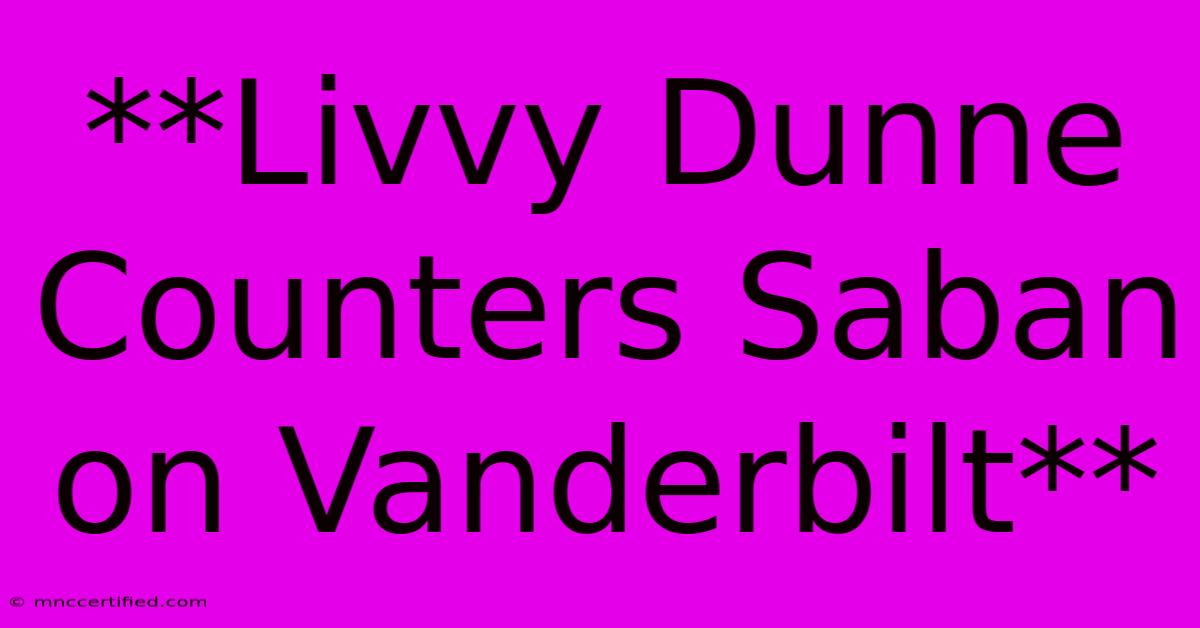**Livvy Dunne Counters Saban On Vanderbilt**

Table of Contents
Livvy Dunne Counters Saban on Vanderbilt: A Look at the Controversy
Livvy Dunne, a renowned gymnast and social media influencer, recently made headlines after she publicly criticized Alabama football coach Nick Saban's comments about the recruiting landscape. Saban had specifically mentioned Vanderbilt, Dunne's alma mater, as a school benefiting from "name, image, and likeness" (NIL) deals to attract student-athletes. Dunne, a former Commodore herself, swiftly responded, defending her university and emphasizing the importance of student-athlete compensation.
Saban's Comments and the NIL Debate
During a press conference, Saban expressed his concern about the impact of NIL on college athletics, claiming some schools were using the opportunity to lure top recruits with lucrative deals. He singled out Vanderbilt, suggesting they were using NIL as a "competitive advantage" due to their location in Nashville, a city known for its thriving music and entertainment industry. This fueled a broader conversation about the complexities of the NIL era and its effect on college sports.
Dunne's Response and the Importance of Athlete Compensation
Dunne, a prominent figure in the NIL space, wasn't shy in voicing her disagreement with Saban's remarks. She took to social media, highlighting Vanderbilt's commitment to academic excellence and its ability to attract athletes based on more than just financial incentives. Dunne emphasized the importance of student-athlete compensation, arguing that NIL deals were a necessary step towards fairness and equity in college sports.
The Controversy and the Future of NIL
Saban's comments and Dunne's response ignited a debate about the future of college sports and the role of NIL in recruiting. While Saban's concerns about a potential "arms race" in NIL spending are legitimate, Dunne's stance highlights the critical need for athletes to benefit from their own name, image, and likeness. The controversy raises questions about the ethical considerations surrounding NIL, the need for regulations and oversight, and the long-term impact on college athletics.
A Look at Vanderbilt Athletics
Vanderbilt University has a rich history of academic excellence and athletic achievement. While the football program has faced challenges in recent years, the university has consistently produced strong programs in other sports, particularly in women's athletics. The university's location in Nashville provides a unique opportunity for student-athletes to engage with the city's vibrant entertainment scene and build their brand through NIL partnerships.
The Power of Athlete Voices
Dunne's response to Saban's criticism underscores the growing influence of athlete voices in the NIL era. Student-athletes are no longer solely beholden to coaches and institutions. They are increasingly becoming active participants in shaping the landscape of college sports. The ability of athletes like Dunne to utilize their platform to advocate for themselves and their peers will undoubtedly play a significant role in the future of NIL and college athletics.
Conclusion
The exchange between Livvy Dunne and Nick Saban represents a microcosm of the larger conversation about NIL in college sports. It highlights the complexities, challenges, and opportunities presented by this new era in athletics. As NIL continues to evolve, it's essential for athletes, coaches, universities, and governing bodies to work together to create a fair and equitable system that benefits all parties involved. Dunne's voice, and the voices of other athletes, are crucial in shaping this future and ensuring that student-athletes have a greater say in their own careers.

Thank you for visiting our website wich cover about **Livvy Dunne Counters Saban On Vanderbilt** . We hope the information provided has been useful to you. Feel free to contact us if you have any questions or need further assistance. See you next time and dont miss to bookmark.
Featured Posts
-
Viral Video Prithvi Shaw Birthday Dance
Nov 10, 2024
-
Commercial Vs Business Auto Insurance
Nov 10, 2024
-
Do You Get Bond Money Back In Georgia
Nov 10, 2024
-
Arcane Season 2 Shifting Power Dynamics And Conflict
Nov 10, 2024
-
Printable Insurance Verification Form
Nov 10, 2024